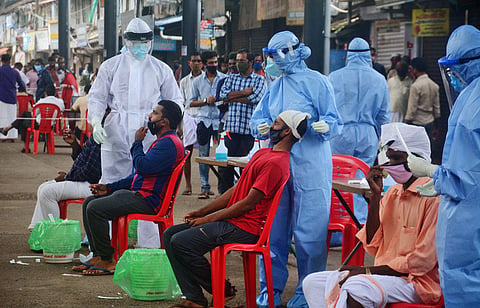

THIRUVANANTHAPURAM: A higher number of people without travel history dying of Covid-19 and hospital-acquired infection leading to some deaths in the state are among the startling findings in the second volume of the COVID Death Report.
The report released by the health department on Wednesday stated that 44 out of 51 Covid deaths during the audit period were of people who had no travel history.
The study -- which analyzed 49 Covid deaths in July and two in June -- stresses the need for a focused approach among people with comorbidities after it found that 48 of those persons had comorbidities including diabetes, hypertension, and cancer.
The report, however, does not mention the number of patients who contracted the infection from hospitals.
Prepared by the State Death Audit Committee, the findings have reiterated that COVID patients with underlying conditions are more likely to die than healthy persons.
"The finding indicates that a comprehensive plan is imperative for the population group with comorbidities. The state, unfortunately, has a high number of hypertension, diabetes, and cancer cases. Reverse quarantine must be followed strictly and people must lend wholehearted support," an officer who took part in the audit told TNIE.
Meanwhile, some health department officers are of the opinion that the state should follow West Bengal, which has decided to conduct a survey to identify people with comorbidities to bring the death rate down. Reports had earlier pointed out that comorbidity accounts for 90 per cent of the Covid deaths in West Bengal.
"Using Kudumbashree and Asha workers, some data was collected regarding the spread of high-risk groups in a particular area. It needs to be checked whether the data is comprehensive. Or else, it should be updated and intervention programs launched without delay," said a health department officer.
Among other findings, age appears to be an important factor in mortality as the maximum number of deaths (29) were reported in the 60-79 age-group, followed by 14 deaths in the 40-59 age-group. Also, there were no deaths among patients aged below 20. The number of deaths was higher among males, 35 of whom died during the study period.
The first report -- that came out in June -- had analyzed 22 deaths, highlighting fatigability, breathlessness, fever, cough, and diarrhea as the early symptoms in patients at the time of admission.
Also, comorbidity played a major role in worsening the condition, as 19 patients had pre-existing conditions like diabetes, hypertension, cancer, coronary heart diseases and chronic kidney disease.
In August, deaths showed an upward trajectory as per a weekly data analysis.
This month alone has so far reported 194 deaths, out of a total of 267 deaths. The first week of the month (Aug 1 to 7) saw 29 deaths. The toll increased to 37 in the second week (Aug 8 to 14) and the third week reported (Aug 15 to 21) 64 deaths. Between August 22 and 26, as many as 64 deaths were recorded.